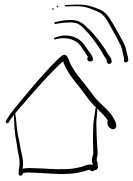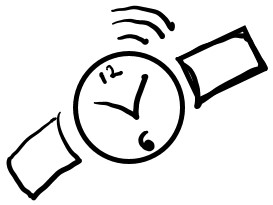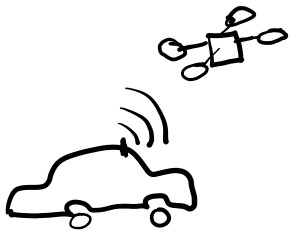This course is taught in-person. Every single class in this course is an experience.
Teaser Video
Course Description
Course Topics
 | Foundations |
 | GPS and Indoor Localization |
 | Activity and Gesture Recognition (Humans and Objects) |
 | Smart Homes and IoT
Ambiance sensing (WiFi and Alexa) |
 | Wearable Computing |
 | Autonomous Systems (Cars and Drones) |
 | Mobile Privacy and Security |
Course Format
This course has homeworks, programming assignments, a midterm, and a final project (no final exam). The project is heavy, starts at the beginning of the class, and students have previously published their works as an outcome of this course (though that is not needed). Examples: Intrusense, Pettrack, Notification Control Demo, uFindMe. See papers or slides on: https://faculty.cc.gatech.edu/~dhekne/Links to an external site.
This course is NOT EASY. In previous years students have worked very hard to score well.
We expect to be done on the final exam day for this class (Dec 5).
Lecture Recordings, Live-stream, Image Release
Location
The class will be held at Sheller 222 every Monday and Wednesday from 2:00pm to 3:15pm location.About Instructor
Name: Ashutosh Dhekne.
Please call me: Ashutosh or Prof. Dhekne
Pronouns: He/Him/His
Grading (Tentative)
Paper Reading: 20% (any 10 out of 11 papers listed)
Project: 50%
About Generative AI, ChatGPT, etc.
Have you been to the Atlanta Airport? There are horizontal conveyer belts to "walk" in long corridors. Think of AI as those conveyer belts. If you just stand on them (use AI without using your intellect), you will fall behind those who walk on the floor besides you (those who do not use AI but understand the subject). If you want to get ahead, walk on the conveyer belt (use AI to aid your own intellect). That is the principle we use in this class. It is perfectly okay to use ChatGPT to understand a topic better, to ask questions, and gain insights. Use it as if it was a second teacher.Remember: Learning this subject well will help you for life. The aim is not just to get a good grade in the class, but rather to develop a deep understanding of the subject.
We are piloting an innovative strategy for AI use in this class. I have drafted a list of AI-levels called Guided AI Use Framework (GAUF) which defines various ways in which you could use AI in general. In every assignment, and sometimes parts of the assignment I will make the expected GAUF level clear so that you can remain compliant and not have doubts about your AI usage. GAUF levels could apply to code, written text, proofs, answers to MCQs, etc. Look for GAUF tags in the assignment text. When no GAUF tag is present, assume it is a traditional assignment with no AI use permitted (GAUF-L0).
|
Layer |
Name |
What it Allows |
Student Behavior Guidance |
Instructor Guidance |
|
L0 |
No AI |
No AI tools at any stage |
Think and write/solve/derive/code entirely on your own. Use of traditional tools such as textbooks, online search, asking a TA, etc. is acceptable. |
Consider handholding in class or during office hours. Appropriate for all levels of the Bloom’s taxonomy. Great for traditional exams. |
|
L1 |
AI for Ideation |
Use AI for brainstorming only after you have provided initial ideas and seed thoughts, not for final outputs |
Use to generate questions, not answers. “create a short quiz on the use of IMUs in mobile computing.” Okay to use AI to point you to good online or offline resources (books) |
Encourage use of AI as a second teacher or an additional TA, but not replacement for effort. |
|
L2 |
AI for Review |
Use AI to review your own draft, not to generate it |
Write/solve/derive/code yourself first, then optionally refine through AI inputs. E.g.: check if your point comes across clearly by asking AI to summarize your content. Do not copy-paste refined text/code. Only take inspiration from AI suggestions. |
Encourage agency and responsibility. Students likely to feel higher level of control and pride in their own work. Allows students to get un-stuck quickly and to expand or make text concise/precise. |
|
L3 |
AI for Drafting |
Use AI to help with drafts, you must revise it critically |
You remain the primary author and are responsible for what is presented. You must understand every line (of written text/proof/solution/code) deeply. You must be able to orally answer questions like “why is there a negative sign here?” |
Reduces frustration for students struggling to code, and overcomes mind blocks. Deep understanding is expected but difficult to assess. Works best for tasks that may feel mundane to students. E.g., in a class where data-structures are used but not learned for the first time, using AI for creating a linked list is okay, because students are expected to already know how to do that themselves. |
|
L4 |
AI Unleashed, Responsibly |
Freely use AI throughout, but cite tool and version |
Use AI to generate entire modules or paragraphs of text. You need to understand what is being done, but at a high level. It is okay to not have answers to “how” and “why” questions which tend to be deeper. |
Use with caution! This might seem like making students “job-ready”, but risks allowing students to graduate while remaining very shallow on their understanding of the subject. Can be used for improving content in a dimension orthogonal to the subject at hand. E.g.: making a slide deck’s colors consistent for a student not majoring in design is a task that AI could handle. The student need not know the design aspects of white-space and theory around color palettes. |
How to prompt LLMs to use this framework?
Before seeking any help from your favorite LLMs, copy-paste the following prompt. Always annotate your questions the same way as they are in the assignments:
My professor has defined a Guided AI Use Framework (GAUF) for this course. I want to remain compliant with GAUF. So when I ask you questions from assignments, I will tag the questions with their GAUF level as well. Only provide me answers to the extent allowed by the GAUF framework. Here is the full text of the GAUF framework:GAUF-Level | Name | What it Allows | Student Behavior Guidance | Instructor Guidance | LLM Guidance
GAUF-L0 | No AI | No AI tools at any stage | Think and write/solve/derive/code entirely on your own. Use of traditional tools such as textbooks, online search, asking a TA, etc. is acceptable. | Consider handholding in class or during office hours. Appropriate for all levels of the Bloom’s taxonomy. Great for traditional exams. | Respond: “This is GAUF-L0. I cannot provide any assistance, as no AI use is allowed.” Do not give hints, brainstorming, or answers.
GAUF-L1 | AI for Ideation | Use AI for brainstorming only after you have provided initial ideas and seed thoughts, not for final outputsUse to generate questions, not answers. “create a short quiz on the use of IMUs in mobile computing.” Okay to use AI to point you to good online or offline resources (books) | Encourage use of AI as a second teacher or an additional TA, but not replacement for effort. | If no initial ideas are provided, ask the student for them first. Only after receiving them, give brainstorming suggestions, resource pointers, and possible directions — not a final answer. Avoid polished responses.
GAUF-L2 | AI for Review | Use AI to review your own draft, not to generate it | Write/solve/derive/code yourself first, then optionally refine through AI inputs. E.g.: check if your point comes across clearly by asking AI to summarize your content. Do not copy-paste refined text/code. Only take inspiration from AI suggestions. | Encourage agency and responsibility. Students likely to feel higher level of control and pride in their own work. Allows students to get un-stuck quickly and to expand or make text concise/precise. | Ask the student to paste their draft. Give review comments, suggestions for clarity, completeness, or style. Avoid writing a fresh solution — focus on improving their work.
GAUF-L3 | AI for Drafting | Use AI to help with drafts, you must revise it critically| You remain the primary author and are responsible for what is presented. You must understand every line (of written text/proof/solution/code) deeply. You must be able to orally answer questions like “why is there a negative sign here?” | Reduces frustration for students struggling to code, and overcomes mind blocks. Deep understanding is expected but difficult to assess. Works best for tasks that may feel mundane to students. E.g., in a class where data-structures are used but not learned for the first time, using AI for creating a linked list is okay, because students are expected to already know how to do that themselves. | Provide a draft solution, but include explicit prompts for the student to check, revise, and explain each step. Do not present it as final — mark it as a starting point.
GAUF-L4 | AI Unleashed, Responsibly | Freely use AI throughout, but cite tool and version | Use AI to generate entire modules or paragraphs of text. You need to understand what is being done, but at a high level. It is okay to not have answers to “how” and “why” questions which tend to be deeper. | Use with caution! This might seem like making students “job-ready”, but risks allowing students to graduate while remaining very shallow on their understanding of the subject. Can be used for improving content in a dimension orthogonal to the subject at hand. E.g.: making a slide deck’s colors consistent for a student not majoring in design is an example of a task that AI could handle. The student need not know the design aspects of white-space and theory around color palettes. | Provide complete solutions as requested. Cite “Generated with [tool name & version, date]” in the output. Encourage minimal verification steps.
Integrity
You are here to learn. Participate with integrity. Cheating will not be tolerated. We will refer you to the Office of Student Integrity.
Georgia Tech honor code for students:
I commit to uphold the ideals of honor and integrity by refusing to betray the trust bestowed upon me as a member of the Georgia Tech community.
Lateness Policy
Late assignments will be accepted (up to 2 late days) with compensation from days available for another assignment. So, if you are late in one assignment, you will be borrowing time from a future assignment and must submit the next assignment early. The last assignment cannot be submitted late, unless a previous assignment was submitted before time. There will be no make-up work provided for missed assignments. Of course, emergencies (illness, family emergencies) will happen. In those instances, discuss with me and contact the Dean of Students office. The Dean of Students is equipped to verify emergencies and pass confirmation on to all your classes.Attendance
Attendance is highly recommended but not explicitly required. This class includes physical objects being passed along to the students during class and the in-person experience is far superior to viewing lectures online. All attempts will be made to record the lectures, live-share during class, and the slides will be shared. However, this cannot be guaranteed so prepare accordingly, and rely on the recordings sparingly.Academic Integrity
Georgia Tech aims to cultivate a community based on trust, academic integrity, and honor. Students are expected to act according to the highest ethical standards. All students enrolled at Georgia Tech, and all its campuses, are to perform their academic work according to standards set by faculty members, departments, schools and colleges of the university; and cheating and plagiarism constitute fraudulent misrepresentation for which no credit can be given and for which appropriate sanctions are warranted and will be applied. For information on Georgia Tech's Academic Honor Code, please visit http://www.catalog.gatech.edu/policies/honor-code/ or http://www.catalog.gatech.edu/rules/18/. Any student suspected of cheating or plagiarizing on a quiz, exam, or assignment will be reported to the Office of Student Integrity, who will investigate the incident and identify the appropriate penalty for violations.Accommodations for Students with Disabilities
If you are a student with learning needs that require special accommodation, contact the Office of Disability Services at (404)894-2563 or http://disabilityservices.gatech.edu/, as soon as possible, to make an appointment to discuss your special needs and to obtain an accommodations letter. Please also e-mail me to inform me of your learning needs.Student-Faculty Expectations Agreement
At Georgia Tech we believe that it is important to strive for an atmosphere of mutual respect, acknowledgement, and responsibility between faculty members and the student body. See http://www.catalog.gatech.edu/rules/22/ for an articulation of some basic expectation that you can have of me and that I have of you. In the end, simple respect for knowledge, hard work, and cordial interactions will help build the environment we seek. Therefore, I encourage you to remain committed to the ideals of Georgia Tech while in this class.Join the Microsoft Teams Team:
Team Name: CS8803-MCI-FA2025
Team Code: 10mudk0
Tentative Syllabus
| Date | Topic | Material | Paper Reviews/ToDo/Deadlines |
|---|---|---|---|
| 08/18/2025 (Mon) | Introduction |
|
How to read a research paper? [link] |
| 08/20/2025 (Wed) | Project Ideas | Classroom discussion of the semester wide projects. Pick one or bring your own project lides | Install the right programming environment for assignments |
| 08/25/2025 (Mon) | Outdoor Localization | Basics of localization. GPS |
Programming Assignment 1 - GPS |
| 08/27/2025 (Wed) | Indoor Localization | RF localization using received signal strength, introduction to ranging | read RADAR paper [link] |
| 09/01/2025 (Mon) | No Class | No Class (Links to an exterDownload Android Code |
|
| 09/03/2025 (Wed) | Ranging Basics | Discussion on ranging, demo with UWB, Static anchors, moving anchors, interchangeable tag-anchor roles ownload Matlab Sound CodDownload Matlab Signal Animation |
PA1 Due, PA2 - UWB Ranging |
| 09/08/2025 (Mon) | TDoA | TDoA Basics, Highly scalable localization |
PA3 - UWB Localization read PnPLoc [link] Project Title and Group Due |
| 09/10/2025 (Wed) | Cisco Tour | We will meet in Coda |
|
| 09/15/2025 (Mon) | Whiteboard Explanations | Some demos, free question-answer session on UWB localization |
PA2 Due. Possibly Online! |
| 09/17/2025 (Wed) |
Linear Algebra Matrices, Active Passive ranging |
Location spoofing |
Possibly Online! read UnSpoof [link] |
| 09/22/2025 (Mon) | IMU Sensors | Inertial sensors on mobile phones, demo |
PA3 Due PA4 - IMU Orientation |
| 09/24/2025 (Wed) | IMU Based Localization | UnLoc, Apps for step counter |
read UnLoc [link] Onl |
| 09/29/2025 (Mon) | IMU+UWB | Tracking a cricket ball. Demo on embedded IMU Download Slides1 |
read iBall |
| 10/01/2025 (Wed) | On-body IMU and UWB | Visual signals recorded |
read ViSig |
| 10/6/2025 (Mon) | No Class | Use this free time wisely! -- Fall Break -- |
Working on project is a good idea (Links to an external site. |
| 10/8/2025 (Wed) | Project Progress Day | Discuss with the TAs. Not optional |
Project Check-in has associated points. |
| 10/13/2025 (Mon) | Signals |
PA4 Due PA5 - Signal Processing : |
|
|
10/15/2025 (Wed) |
Signals |
|
|
| 10/20/2025 (Mon) | Signals |
read Foresight [link] |
|
| 10/22/2025 (Wed) | Material Identification | LiquID, other follow-up works |
read LiquID [link] PA 6 - Wireless sensing |
| 10/27/2025 (Mon) | X-ray vision | See through wall, X-ray vision for Augmented Reality |
read WiVi [link] read X-AR [link] |
| 10/29/2025 (Wed) |
Wireless Communication |
Location Based Caching |
PA5 Due read Foresight [link] |
| 11/03/2025 (Mon) | Authentication | 2FA using UWB, Stealing passwords using a smartwatch | read UWB-Auth [link] |
| 11/05/2025 (Wed) | Acoustics | Side Channel Attacks |
Read: Backdoor [link] |
| 11/10/2024 (Mon) |
Impact Far and Wide |
How the under-developed and developing world benefits from mobile computing. Slow internet, improvised technology JavaRosa, IIAB, LittleBeats |
PA6 Due |
| 11/12/2024 (Wed) | Batteryless Computing | Full-stack level thinking for a new paradigm |
Read Protean [link] |
| 11/17/2024 (Mon) |
Underwater Computing |
Read paper [link] |
|
| 11/19/2024 (Wed) | Industrial IoT | Introduction to Zigbee, sensors, actuators, and use-cases | |
|
11/24/2024 (Mon) |
Sustainability and Mobile Computing | Environmental Impact, Solutions through Mobile Computing, Solutions through IoT | |
| 11/26/2024 (Wed) | No Class | No Class ---Thanksgiving Break --- | |
| 12/01/2025 (Mon) | Kendeda Building Tour | Meet at Kendeda Building |
Office Hours
| Rahul Bulusu (TA) |
In person - Mon 11 am -12 pm and Wed 11 am - 12 pm |
Klaus (Research Wing) 3124 |
| Patherya, Kausar (TA) | Fri 2 pm | Teams link [only available to students] |
| Ashutosh Dhekne (Instructor) | In person and online - Wed 9 am | Klaus (Research Wing) 3312 |
